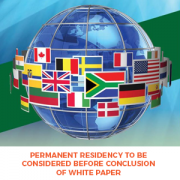Radio Interview: Marisa Jacobs on SAFM
/in Archived, News /by XpatwebShould you have missed the interview please feel free to listen to it below.
Part 1:
Part 2:
Time aired: 07/27/2017 at 2:50PM
Radio interview: Marisa Jacobs on SAFM
/in Archived, News /by Marisa JacobsManaging Director of Xpatweb, Marisa Jacobs, was interviewed on how employers can obtain a work Visa for a foreign skilled employee. Should you have missed the interview please feel free to listen to it below.
Part 1:
Part 2:
Time aired: 07/27/2017 at 2:50PM
EXPECT PLENTY OF SOUTH AFRICANS ABROAD RETURNING HOME OR EMIGRATING
/in Archived, News /by Marisa JacobsThe draft law published proposes a far harsher tax treatment, recommending that the exemption section 10(1)(o)(ii) be completely repealed. This means foreign employment income will become fully taxable, and the only relief may be claimed is foreign taxes paid as a tax credit. For example, where the employee falls into the 45% tax bracket and pays 25% tax in the foreign country, the SARS will now collect the difference of 20%.
The current tax law determines that South African tax residents abroad must disclose their world-wide income to SARS, and may then claim an exemption on their employment income physically earned outside South Africa. The then Minister Pravin Gordhan announced in his 22nd February 2017 Budget Speech that changes to this section was on the horizon. The suggestion was made that the exemption should not apply where the employee is not being taxed in the foreign country.
There are limited options for South Africans abroad, should this law take effect. One alternative would be to properly emigrate, in which case there is a deemed disposal capital gains tax event. SARS probably anticipates this likely move, as the 2016/17 tax return now has a specific disclosure hereon, which never previously existed. Other taxpayers are looking at establishing tax treaty residency in another country, but this is not as simple as getting a tax residency certificate somewhere else. Anyone who has been through a SARS process hereon would know how complex this may become.
We have seen some expatriates indicating that with full tax on international employment income, which is what is effectively proposed, coupled with the high costs of international work, coming home may be their only alternative.
This law is proposed to take effect 01 March 2019 onwards, thus providing a grace period for expatriates to get their house in order. More urgent, however, is the comment deadline of 18 August 2017, so expatriates and their advisors should act in haste in submitting their comments on this change to National Treasury.
As published by Jerry Botha, Tax Consulting South Africa
Renewing general work visas challenging in South Africa
/in Archived, News /by Marisa JacobsHolders of general work visas, the most commonly sought visa for foreign professionals working and living in South Africa are finding it practically impossible to renew their visas.
Applications are regularly rejected for reasons not given or because the Department of Labour has found that issuing the visa could discriminate against South Africans, even in cases where the applicants’ jobs depend on them being fluent in a language not spoken in South Africa.
The Department has added layers of bureaucracy and inconsistency in carrying out directives and applying the law, compounding delays in a process already fraught with hurdles.
Stefanie de Saude, of De Saude Attorneys, hears reports almost daily of professionals who have lived and worked legally in South Africa for years, now denied renewed work visas and facing the prospect of losing their homes and jobs and disrupting their families.
The law requires the Department of Labour to assess each application it receives to determine whether it complies with the regulations 18(3) (a) to (e). These regulations require, amongst other things, that a diligent search is carried out for a job candidate in South Africa before a foreign applicant is appointed, and that the skills or experience of a suitable South African is not available in the labour market. Thereafter the Department of Labour will issue a certificate of recommendation to the Department of Home Affairs.
In theory, this should be a relatively simple process taking no more than around 30 days. In practice, however, the assessment runs to site visits, SARS checks and more, and can take in the order of seven months to complete. In many cases, the Department of Labour rejects the application at which point, Home Affairs rejects it too, citing a ‘negative recommendation from the Department of Labour’ without providing adequate reasons for the rejection.
Limited scope to appeal
There is limited scope to appeal when the reason for the application being denied has not been disclosed.
“Indeed, in our work on numerous such applications, we have only twice been told why the certificates were not issued – and in both cases, the Department of Labour had found that the foreign language requirements discriminated against South Africans. Unfortunately, for the employers and applicants concerned, those foreign language skills were vital in order to carry out the work,” explains de Saude.
The gap between theory and practice is confusing for all concerned. In a recent High Court judgment, the applicant in the case applied for a waiver of the need for a Department of Labour certificate. He was rejected, for reasons that we have seen before – in essence, the decision maker reiterated the basis of the requirement of the Department of Labour certificate, without considering whether a waiver from the usual rules was deserved in this case. On review, the judge found that that the decision maker had misapplied his/her mind, and had been needlessly rigid.
Despite this judgement, we still receive waiver refusals for exactly the same reason and the outcome of work visa applications has begun to look like a foregone conclusion – bad news for applicants.
Critical skills also affected
These challenges are also affecting critical skills visas to some degree. Where once, applicants in possession of scarce and critical skills might have been issued with five-year visas, without the need for an employment contract at the time of application, they are now being issued with 12-month visas, bound to particular employers, so undermining the country’s efforts to bring important skills resources into South Africa and support much-needed skills transfer. The list itself lacks clarity and fails to support the intentions of the law. For example, the Department of Home Affairs incorrectly interprets the BPO category as covering only call centres and no other BPO services, therefore any critical skills applicants in this category would have to work in a call centre in order for the visa application to be approved. The emphasis is therefore not on the skill at all but rather the sector.
By Stefanie de Saude
As published by http://www.bizcommunity.com
FIND US
Johannesburg
17 Eaton Avenue,
Bryanston, Johannesburg,
Gauteng, 2191
South Africa
George
55 York Street
Dormehls Drift
George, 6529
South Africa
CONTACT US
Telephone:
South Africa: 011 467 0810
Postal:
PO BOX 35046
Northcliff
2115
IN THE NEWS
- Another Positive Move To Attract More Tourists To SA
- Bringing in the Bomb Squad at Home Affairs
- How Home Affairs’ Immigration Reforms Could Drive SA’s Growth in 2025
- Phindiwe Mbhele on Remote Work Visa: Splendid Cape Town is wooing more and more digital nomads
- Cape Town Shines, and So Does South Africa’s New Critical Skills Visa Overhaul





